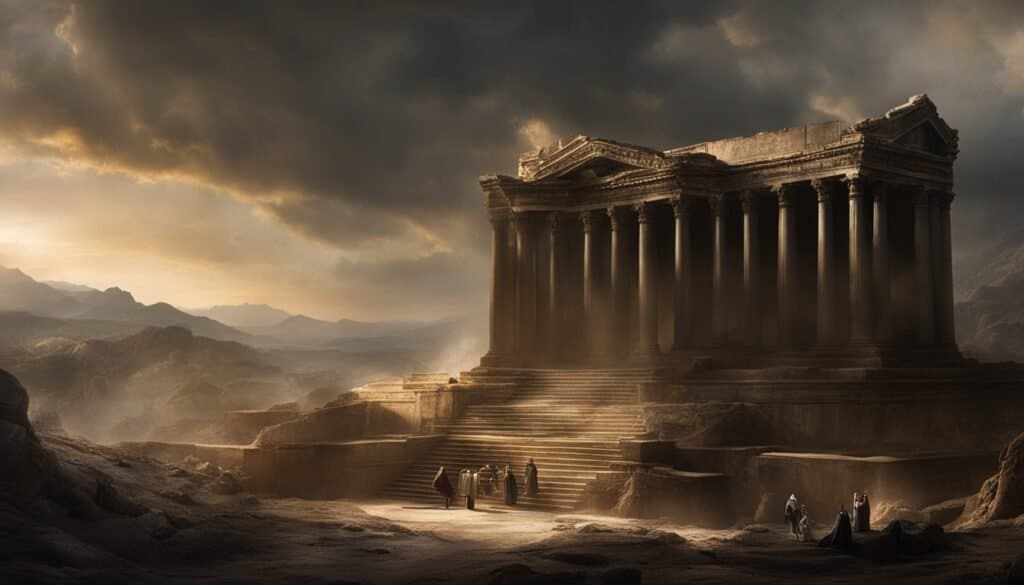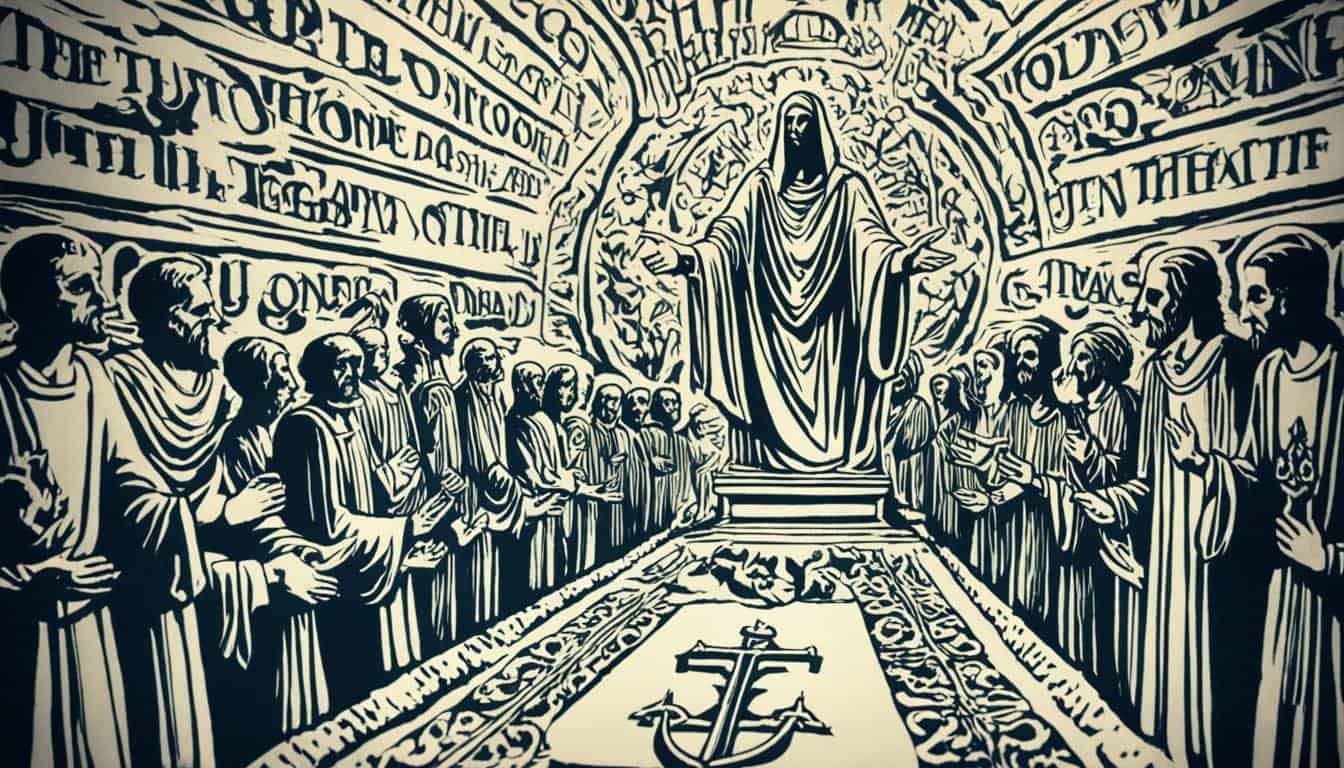What if the choices we make in life decide our future after death? This question makes us think deeply about Judgment After Death. It’s a key idea in Christianity. By looking into biblical teachings on judgment, we learn about its importance and how it affects our future.
Judgment is more than just being held accountable. It’s filled with hope for forgiveness through Christ. By reading the Bible, especially in Hebrews 9:27, we understand how our actions match up with Christian doctrine on judgment. Let’s discover insights that light our way to eternal life.
Key Takeaways
- Understanding the significance of judgment in Christian doctrine.
- Exploring the biblical foundation for Judgment After Death.
- Recognizing Christ’s role as the judge in the process.
- Expecting the dual nature of judgment: accountability and hope.
- Evaluating our deeds in light of biblical teachings.
The Certainty of Judgment
We all know that judgment is a key part of our beliefs. The Bible tells us that judgment is sure to happen, as seen in Hebrews 9:27. It says, “And as it is appointed unto men once to die, but after this the judgment.” This means every person will be judged after they die. It’s important for us to think about this when we make choices.
The Biblical Basis for Judgment
The idea of judgment comes from many Bible verses. These verses teach us about the importance of our choices. As believers, we follow these teachings to live right, according to Christian beliefs.
Understanding the Fundamental Belief
This belief affects how we live every day. We know our actions have consequences in our faith. Church teachings back this up, making us think about our actions before God. We try to live by the Bible’s teachings, which guides us.
Looking into these teachings motivates us to live right. For more on what the Bible says, check out this link.
Christ as the Judge
Understanding Jesus’ role in judgment helps us grasp a key part of our faith. The New Testament shows Christ as the judge, chosen by God the Father. This role means He decides each person’s future.
The Role of Jesus in the Judgment Process
Jesus being the judge is a big part of our faith. John 5:22 says, “the Father judgeth no man, but hath committed all judgment unto the Son.” This shows Jesus has all the power to judge. It tells us how important His decisions are and what we should expect from His judgment.
Key Biblical Verses on Christ’s Authority
Many verses in the Bible talk about Christ’s power in judgment. For example, 2 Corinthians 5:10 says, “For we must all appear before the judgment seat of Christ; that every one may receive the things done in his body, according to that he hath done, whether it be good or bad.” These verses remind us of the importance of our actions and our responsibility to Christ. They encourage us to follow the Gospel’s teachings.

| Biblical Verse | Context | Implication |
|---|---|---|
| John 5:22 | All judgment is given to the Son | Christ holds ultimate authority |
| 2 Corinthians 5:10 | Judgment seat of Christ | Accountability for actions |
| Matthew 25:31-46 | Separating the sheep from the goats | Judgment based on deeds |
Judgment After Death
Thinking about judgment after death is deep and important for our spiritual path. It’s about understanding the fairness and justice of divine judgment, as seen in scripture. Knowing what to expect helps us prepare our hearts and minds for this big moment.
The Nature of Judgment
Judgment is about being accountable and having our actions judged. Revelation 20:12 says, “And I saw the dead, small and great, stand before God; and the books were opened.” This shows us that everything we’ve done and thought will be seen by God. So, we can expect a thorough check of our lives by God’s standards.
What to Expect in Judgment
When judgment comes, we’ll face a clear and honest look at our lives. We’ll be asked about our choices and our spiritual path. This makes us think about how we live and what we believe. The early Church Fathers offer guidance on this, showing us how to live right.
Their insights help us see the value of living by gospel values. Looking to God’s Word for comfort and wisdom helps us understand our final judgment better.
| Aspect | Description |
|---|---|
| Accountability | Everyone will receive a personal assessment of their lives based on their deeds. |
| Justice | The judgment will reflect God’s fairness, and all actions will be weighed impartially. |
| Cleansing | This process provides an opportunity for purification, defining the true essence of each person’s soul. |
| Hope | The promise of mercy for those who sincerely seek repentance offers comfort as we approach judgment. |
Thinking about judgment after death helps us a lot. It encourages us to look at our lives honestly. We can work on making our actions match our spiritual beliefs.
The Basis of Judgment
In Christian belief, judgment is based on a deep look at our lives through the Gospel. We must evaluate our actions carefully. Our deeds show our faith and how well we understand the Bible. Revelation 20:12 tells us our actions are important when we face God.
Evaluating Deeds Against the Gospel
Looking at the basis of judgment means seeing if our actions match the Gospel’s teachings. Our choices show our faith level. Every action shows our commitment to the Bible’s teachings. Thinking about this makes us reflect on our spiritual state.
The Importance of the Book of Life
The Book of Life is key in judgment. It’s a record of those saved by faith in Christ. Being in this book shows our bond with God. Revelation 20:12 warns that those not in it face serious consequences. This book teaches us to live by God’s word and act on our faith.

Thinking about our future shows us the importance of our actions and our place in the Book of Life. Every choice we make shows our commitment. We should live in a way that matches God’s will, as the Bible teaches.
For more on how faith and actions connect, check out resources on evaluating deeds and their spiritual impact. Visit this informative link to learn more.
How Does the Concept of Judgment After Death Relate to the Stories of Leprosy in the Bible?
In many leprosy biblical stories, the affliction serves as a metaphor for sin and spiritual decay. These narratives highlight the consequences of moral failures, linking judgment after death with earthly suffering. The cleansing of lepers symbolizes redemption, suggesting that one’s state in life reflects their spiritual standing before divine judgment.
Separation of the Righteous and the Wicked
The idea of separating the righteous from the wicked is a key theme in Christian beliefs. It’s shown in Matthew 25:31-32, where the Son of Man separates people like a shepherd sorts sheep from goats. This shows us the final judgment and how our choices on earth matter.
This teaching tells us about the justice of God and the importance of our actions. It shows how our faith and actions in life will guide us in the end.
Matthew 25 teaches us that this separation is real and based on our beliefs and actions. Believers know a final judgment is coming, which makes us think about our actions every day. If we live right, we’ll be with the righteous. But if we don’t, we’ll be with the wicked.
This idea makes us think about our spiritual path and how we treat others. It tells us to act in line with our beliefs to be with the righteous. Thinking about the final judgment helps us look at our actions and choices. For more insight, check out navigating life’s choices with wisdom from the Bible.
Understanding this separation helps us see our place in God’s plan. It encourages us to live right and be mindful of our actions.
Affiliate Disclosure: "As an Amazon Associate I earn from qualifying purchases made from links in this post. We are a participant in the Amazon Services LLC Associates Program, an affiliate advertising program designed to provide a means for us to earn fees by linking to Amazon.com."

